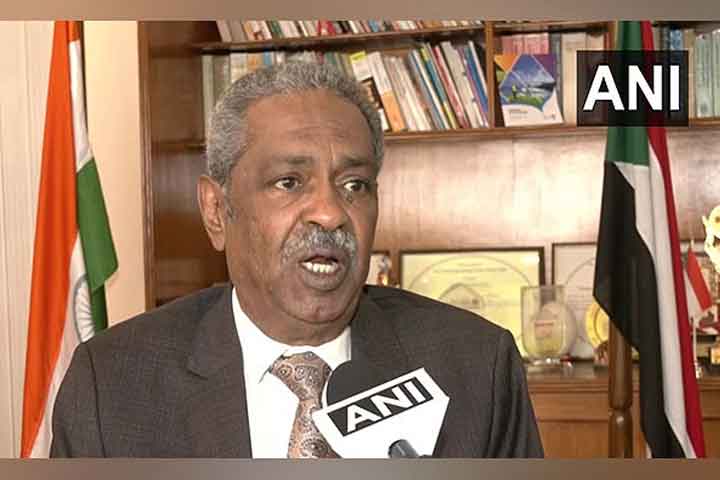Evacuation a “sensitive process” due to political situation, “appreciate” India’s response: Sudanese Envoy
Terming the ongoing conflict in Sudan as “sensitive,” Abdalla Omer Bashir Elhusain, Ambassador of Sudan to India appreciated India’s response and its prompt action to bring back its stranded citizens in Sudan after the conflict began in the county.
“The evacuation process which started a couple of days ago, has been going successfully till now. We took advantage of the ceasefire for the last few days, and most of the diplomatic missions, including the European Union, the US, France, and Jordan, have been evacuated. Yesterday, the evacuation of the Indian citizens have started, and actually, we have been working closely with the Ministry of External Affairs in India to arrange and coordinate this operation. The estimated Indian citizens in Sudan is around 3000,” said the Sudanese Envoy.
He also said, “The evacuation operation started from Port Sudan. A number of estimated between 300-500 Indian citizens have been evacuated by ship and other evacuation processes are going on. The evacuation process is a very sensitive process due to the political situation, due to the violation of the ceasefire. Due to the distance between Khartoum and Port Sudan, where most of the Indian citizens are staying, which is almost 1000 kilometres, they will have to go by road. So, it is very clear and obvious that this needs a lot of arrangements and coordination. We provided security and protection for the convoy from Khartoum towards Sudan. Hopefully, this operation will continue until all Indian citizens come back safe to their homes and to their families.”
Operation Kaveri was launched by India to evacuate Indians stranded in Sudan where the Sudanese Army and paramilitary groups are fighting. Indian Navy has also joined Operation Kaveri with INS Teg arriving at Port Sudan on Tuesday with additional officials and essential relief materials.
“I think I will appreciate and impressed about the response of the reaction of the Indian authorities and especially the people in Ministry of External Affairs. I have been working closely 24 hours a day and we really did a good job in coordinating cooperation, providing necessary permits for aircraft, for ships to fly and to land in Sudan and to bring back Indian citizens,” he added.
Speaking about the current situation, the Sudanese envoy said that there are still violations from the rebel side but the ceasefire is holding better than the previous ones.
“As regards to the current situation on the ground, I think the most important development is that now we’re witnessing the fourth ceasefire. The last three ceasefires were not so successful. But the fourth one, which is going through right now is holding on the ground relatively. I mean, there are still violations from the rebel side. But the ceasefire is holding better than the previous ones,” the Sudanese envoy said.
“I think it is understood that during such a situation of insecurity, of clashes, one of the most scary things, for example, is to bring our people from the shelter to the port of evacuation, in the airport or Port Sudan. So, it is really a very challenging operation, the evacuation of civilians during this time of uncertainty of clashes, it is very sensitive and in my understanding, the volume of problems we faced during this operation, relatively is reasonable”, he added.
Talking further on the decades-old ties, the Envoy said that the ties between the two date back long and that this conflict will not have any negative impact on the relations.
“India and Sudan ties are deeply rooted, I don’t want to talk about history, but India and Sudan also enjoy a very excellent bilateral relationship, since the independence of Sudan in 1956. And even Sudan also participated in 1955 before its independence for the non-alignment movement. India is a major player in that movement, and it kept its relationship with third-world countries even after the end of the Cold War in the 1990s of the last century,” he added.
As India and Sudan enjoy a lot of similarities, cultural similarities, and diversification, he highlighted about the Indians who came to the Northeast African country 100 years ago are now Sudanese.
“India and Sudan have very special ties even in Sudan. We have a Sudanese community originally from India, they came to Sudan 100 years ago, and they are staying there and now they are Sudanese. We have had a very special and very strong relationship with India over the years since our independence in 1956. And we hope that this will continue for the future”, he said.
Speaking about the mediation offered by any country, the envoy said that there was some news of meditation by the United States and Saudi Arabia but this has not been materialized”.
“There is some news about mediation by the United States and Saudi Arabia. But this is still going on, I mean not yet materialized. A lot of peace mediation was offered by the African Union, and three leaders from Kenya, South Sudan, and Djibouti expressed their interest and intention to visit Sudan, to mediate but due to the security situation and the difficulties in arriving in Sudan and we hope that everything will be possible in the coming future”, he said.
27 Apr 2023,23:28
















 Live Tv
Live Tv

